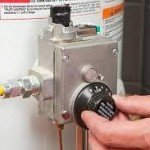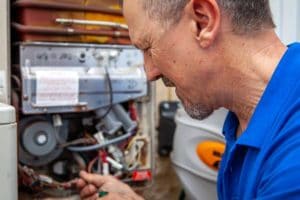Regardless of the reasons why you’re in the market for a new hot water system, you may be finding yourself overwhelmed by the large number of choices available to you. With so many different systems across a wide range of brands, there’s a lot of factors for you to take into consideration.
The real question is, how do you pick the right one for your home and your needs? To make your decision-making process a little easier, we’ve put together a quick guide on the various types of hot water systems you can choose from.
Continuous Flow Or Storage Tank
Also called instantaneous hot water systems, continuous flow heaters are small, wall-mounted units that are ideal for households of 3 people or less. As the name suggests, the unit will provide a continuous flow of hot water while in use and will only heat water as it is needed, leading to reduced energy consumption. Available in electric and gas, continuous flow systems are generally more expensive to purchase upfront but are more cost-effective in the long term. Rinnai, Rheem and Bosch all offer continuous flow hot water systems.
On the other hand, with a storage tank hot water system, water is heated and stored in an insulated tank. In the effort to maintain the temperature of the water at all times, a storage tank heater will need to use more power than an instantaneous system. Unless using solar heat, most storage tank systems will usually have higher running costs as a result. On the upside, storage tank hot water systems have relatively low upfront costs and are usually suited to households of 4 people or more.
Electric Hot Water System
When selecting the best hot water system for you, it’s important to weigh up the upfront versus ongoing costs. Electric hot water systems are fairly affordable to purchase and install, but they are the most costly to run in the long term. Electric hot water systems are generally available in storage tank and continuous flow options across most major brands. A household of 4 people or more will most likely need a 125-160L tank.
By opting for a larger electric storage system, you may be able to switch to a cheaper off-peak tariff. Your system will then heat up overnight, leading to a reduction in electrical bills. While this will make your electric hot water system more economical to run, it will not reduce its impact on the environment.
Gas Hot Water System
In terms of cost and energy efficiencies, gas hot water systems offer the opposite equation to electric heaters. Gas hot water systems tend to be more expensive upfront, with lower overall running costs. When natural gas is used, gas water heaters are far more environmentally friendly than electric systems. Plus, if you experience a black out, you can continue to use your hot water as the system is ignited by a pilot light as opposed to electrical current.
Gas hot water systems are available in tank and instantaneous options. For households of four people or more, a storage system will require a tank of approximately 135-170L.
Solar Hot Water System
Given the nature of a solar hot water system, there is no option to select between continuous flow and storage tank systems. A solar hot water system involves installing solar collector panels on the roof of your home, with a connected storage tank that uses the heat from the sun to regulate water temperature.
As you would expect, solar hot water systems are the cheapest to run, however, purchasing and installing a solar hot water system could set you back thousands of dollars. Thankfully, the government has introduced rebates and incentives to offset costs and encourage the use of sustainable water heating practices.
While there are a lot of benefits to be enjoyed from solar hot water systems, not all homes are suited to them. For one, you need to have enough space for it. The average four-person household will need around 4m2 of roof space to dedicate to the collection panels, plus space on the ground for a 300-360L tank.
Your home also needs to be ideally positioned to make the most of the sunlight, otherwise the heater will have to rely on either an electric or gas booster to make up for the lack of natural heat. Luckily in Perth we get a lot of hot sunny days, so this will tend to only happen during winter and overly cloudy days.
Best Hot Water System Brands
According to a customer satisfaction survey conducted by CANSTAR Blue in 2018, Rheem leads the way in terms of the reliability and effectiveness of its systems. But when it comes to value for money, its Rinnai that comes out on top. Rinnai received 5-star ratings for value, reliability and ease of use, only losing out to Rheem in two out of seven categories. Vulcan is a sub-brand of Rheem that specialises in electric and gas hot water systems, while Bosch offers a wide range of instantaneous hot water systems.
Selecting the right hot water system for your home depends on your financial situation, your commitment to the environment and the size of your household. If you’re looking for a plumber or electrician to handle your hot water system installation, call GA Perry today.




